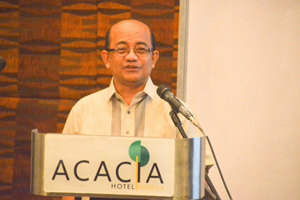 ALABANG, Muntinlupa City – A forum on gene editing recently held here provided the scientific community a venue to discuss the latest global updates on the technology, the challenges on implementation and regulation, and trends on communication and public perception.
ALABANG, Muntinlupa City – A forum on gene editing recently held here provided the scientific community a venue to discuss the latest global updates on the technology, the challenges on implementation and regulation, and trends on communication and public perception.
The forum was hosted by the Philippine Council for Agriculture, Aquatic and Natural Resources Research and Development of the Department of Science and Technology (DOST-PCAARRD), in partnership with the Program for Biosafety Systems (PBS), International Service for the Acquisition of Agri-biotech Applications (ISAAA), and the Department of Agriculture-Biotech Program Office (DA-BPO).
The activity was attended by researchers from state colleges and universities, reviewers and regulators from the Department of Agriculture, and guests from the private sector.
“This is a very good occasion for us to discuss the different advances in gene editing and relate them to regulation,” said Dr. Reynaldo V. Ebora, DOST-PCAARRD Executive Director. “The progress in gene editing has been quite dramatic. Maybe what we know two years ago will be quite different from what we know now in terms of the technology and its implications to regulation,” Ebora emphasized.
Dr. Rashmi Nair, Technical Adviser of PBS and adjunct professor from Michigan State University discussed the regulatory options on gene edited crops and products. She introduced several gene editing techniques and presented the current status of regulation on gene editing in some countries.
The second topic focused on the Clustered Regularly Interspaced Short Palindromic Repeats (CRISPR) (CRISPR)/Cas 9 genome editing initiatives in the Philippines. CRISPR/Cas 9 is the most widely used method in genome editing or targeted mutagenesis.
Meanwhile, Dr. Hayde F. Galvez of the Institute of Plant Breeding-University of the Philippines Los Baños (IPB-UPLB) updated the participants on her team’s ongoing project on capability building for CRISPR/Cas 9. She reported that the project conducts seminars, trainings, and workshops on CRISPR/Cas9 for capacity building of faculty, staff, and students of UPLB as well as those of other SUCs. She also briefly discussed the challenges and opportunities towards mutation plant breeding using CRISPR/Cas 9.
“Communicating the Science of Gene Editing,” was discussed by Cornell Alliance for Science fellow Ms. Aileen A. Garcia. She talked about the overview of and trends in agribiotechnology conversations for the past two years. “Gene editing is a ‘hopeful’ area for conversation because of more and steady pro or positive stories published over time,” she shared.
Ms. Garcia also discussed the new opportunities for communication in three key areas: climate smart crops, social justice, and reducing agriculture’s climate impact. She also shared some helpful and practical tips in communicating the gains from gene editing.
To encourage public discussion and engagement on gene editing, DOST-PCAARRD is open for more collaboration on conducting fora and other related activities.
